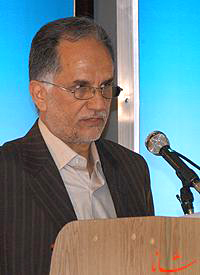The visiting minister made the statement at the 2nd Asian Ministerial Energy Roundtable in the Saudi capital.
Energy ministers from 17 Asian nations, including the oil-rich Persian Gulf Cooperation Council (PGCC) states and major consumers like
The meeting focuses on studying the Asian energy outlook for supply and demand, and the energy and economic interdependence between East and
The first edition was held in
Vaziri-Hamaneh underlined the importance of security of energy market, warning the industrialized states against manipulating its features if they planned to manage the market.
“During the past two years, the great role of the OPEC output surplus in monitoring and alleviating the world’s oil market in favor of consumer states has become evident,” said the top official, however adding the OPEC member states could not be expected to tie up some part of their capitals in order to secure their production capacity surplus.
Offering a solution, he said the need should be met through interaction between the producers and consumers.
Vaziri-Hamaneh shifted to the growing demand for natural gas and said, “The perspective of world’s long-term economic growth reveals that the consumption of energy particularly gas will grow.
“The
“Witnessing a slight drop, oil will maintain its share of global energy demand and gas will gain more in the international market.”
The official said the Asian Continent had the potential for rapid economic development and growth of demand for energy, forecasting the remarkable promotion of oil and gas trade in the Asian countries.
INVESTMENT
Vaziri-Hamaneh assured that the continuation of oil and gas injection to the world markets demanded huge investments in the two sectors.
“It is crystal clear that the economy of oil and gas exporting states fail to meet the whole capital required by the two industries,” said the minister, concluding if the energy consumers did not participate in the investment projects, the supply would not be guaranteed.
“There are sufficient financial resources in the world for the development of oil and gas industries in both downstream and upstream sectors, but the politically motivated obstacles in the way of investments are raising concerns,” he opined.
Any hurdle the international ventures faced would endanger the medium- and long-term supply of energy, warned Vaziri-Hamaneh, adding, “Such political behavior toward trade negotiations and deals and the limitation of some international companies’ attempt to provide the energy likely help those who make waves achieve their objectives in the short run, but cause a sharp rise in costs and an imbalance in rivalry in the energy market in the long run.”
He underlined that investment in the Persian Gulf would finally beef up the security of energy supply, adding, “Investment in the Persian Gulf depends on the stability of the region and regional countries on one hand, and stable world oil prices, desirable rate of return (ROR) of capital, and reasonable revenues for oil- and gas-rich states on the other hand.”
Vaziri-Hamaneh called on the oil producers and consumers to do their best to rid the energy sector of political biases and to observe the international rules and regulations in a bid to help the market players do their jobs.
TRANSFER OF TECHNOLOGY
“If the holders of advanced technologies, which are mostly energy consumer states, evade their responsibility of transferring the know-how to the oil- and gas-rich countries, the energy resources will be wasted and the world will lose a part of nonrenewable energy resources,” said the Iranian minister, concluding that the humanity would concede a big loss and the security of long-term energy supply would be undermined.
Referring to the increasing energy consumption in the world and the global commitment to protect the environment, Vaziri-Hamaneh said the environmental protection was impossible without employing the state-of-the-art technologies in production and consumption of energy carriers.
“It’s years that the industrialized countries have given first priority in their strategic policies to giving variety to sources and technologies of energy, but they do not observe such a right for others,” he added.
The ranking official said oil and gas reserves accounted for over 98 percent of
Vaziri-Hamaneh said his country reserved the right to give variety to renewable sources as well and was determined to achieve the goal.
“Therefore Iran, as a developing country with a young population, has no alternative but to have access to nuclear energy within the Non-Proliferation Treaty (NPT),” justified the minister, adding the international community needed to support the view as it greatly helped establish security of supplying fossil fuels.


Your Comment